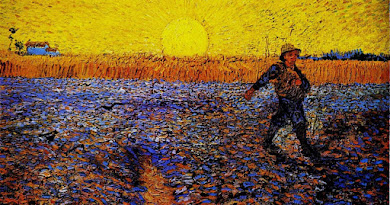Van Gogh, The Sower
Leave the Results to God
Fr. Tony’s Midweek Message
July 21, 2021
One of the wonderful things about Biblical scripture is that it often is polyvalent in meaning, that is, can be patient of several understandings and applications. A passage we have read again and again over our life, if re-read at the right time and with the right heart in a new circumstance, can take on whole new significance for us.
I recently had this experience with a passage that most of us know well, Jesus’ Parable of the Scattered Seed (Mark 4:1-9; Matt 13:1-9; and Luke 8:4-8): a peasant scatters seed in various soils and sees most of his plantings die for various reasons but one of them succeed so well that he recovers 100 times his investment of seed. We know all too well the interpretation put on it by the Gospel writers (Mark 4:13-20; Matt 13:18-23; Luke 8:11-15). The same seed, the preached Word, suffers or thrives depending on the soil where it falls: thin soil along the path is the devil’s temptations that prevent it from even being heard; the rocky soil is where it is received with joy, but because it has no deep roots, dies at the first trial of faith; the seed choked by weeds and thorns is faith that dies because of “cares of the world and love of money”; and the productive good planting is when the word is accepted and truly understood.
But this interpretation sees the saying of Jesus not as a parable, with one point of comparison, but as an allegory, a coded treatment where different elements of the story stand for different things. This interpretation is almost certainly the product of an early Christian homilist, concerned about how their preaching might be received.
But this misses the point the historical Jesus almost certainly was trying to make. Jesus gave many other parables comparing God’s Reign to some kind of seed, and they include no allegorizing.
In one parable, a seed sprouts and grows all on its own regardless of whether the person who planted it knows or understands why it grows (Mark 4:26-34). Jesus thus says that God’s kingdom comes primarily through God’s acts, not ours, and arrives despite our unawareness.
Elsewhere, a tiny mustard seed sprouts and grows into a huge tree-like shrub (Mark 4:31; Matt 13:31; Luke 13:19): tiny, almost imperceptible in its beginnings, huge, overwhelming, and sheltering in its full growth. That difference between small starts and great results is God’s Reign.
In yet another, God’s Reign is like a field sown with wheat in which is mixed noxious weeds whose young plants are indistinguishable from the good wheat plants (Matt 13:25-40): we mustn’t try to rip out the bad ones lest we destroy the good ones as well in the process.
In the Parable of the Scattered Seed, the sower broadcasts seed in un prepared soils, the standard practice of ancient Palestine, far different from our intensive soil preparation, seed selection, and care of plants, including irrigation and pest and weed management.
I have understood for years that the one point of comparison the historical Jesus was making in this parable was that the success of the seed that falls by chance on good soil justifies the apparent carelessness or profligacy of the sower in their other plantings.
But the other day, just after I preached about the Peace of Christ and what it depends on and what it requires of us, I came across the passage of the Scattered Seeds again and had an insight. I realized that the deeper issue Jesus was trying to get at was this: when we are talking about the Reign of God, we need to turn all our concerns and worries about outcomes over to God, because God is Compassion and Providence itself. The one successful bumper crop outweighs all the losses and failures.
Jesus teaches this truth in sayings and parables not using the image of a seed. “God gives the blessing of rain and sun on the wicked and righteous alike” says Jesus. “Can you even add an inch to your height by worrying about it? Then just let your worries and cares go by the boards.” “God may seem crazy to us at times, like that crazy loving father with the two lost sons, the prodigal and the priss, or the crazy woman who throws an expensive party to celebrate finding a lost coin, or the shepherd who goes out after one sheep while forgetting the 99. God’s craziness is actually God’s compassion and love, deeper and greater than we can calculate or imagine. So trust, actually trust, God. Don’t worry about outcomes—he surely doesn’t seem to. Your worries really show how little faith you actually have.”
Siblings in Christ, if we are to have faith at all, we must have trust and confidence in God. We must have patience and be able to see through the dry times, the sparse soils, the failed crops, the apparently wasted seed stock. We must take in stride Church programs and experiments and life projects and community reforms that just don’t seem to “pan out.” We must persevere through disappointment and hurt. We must not be beaten down and care-worn by this broken world and how long it seems to make any progress in healing it. We must have a heart full of assurance that in the end, love wins and compassion triumphs. Because that’s how God’s Reign is.
Grace and Peace, Fr. Tony+













No comments:
Post a Comment